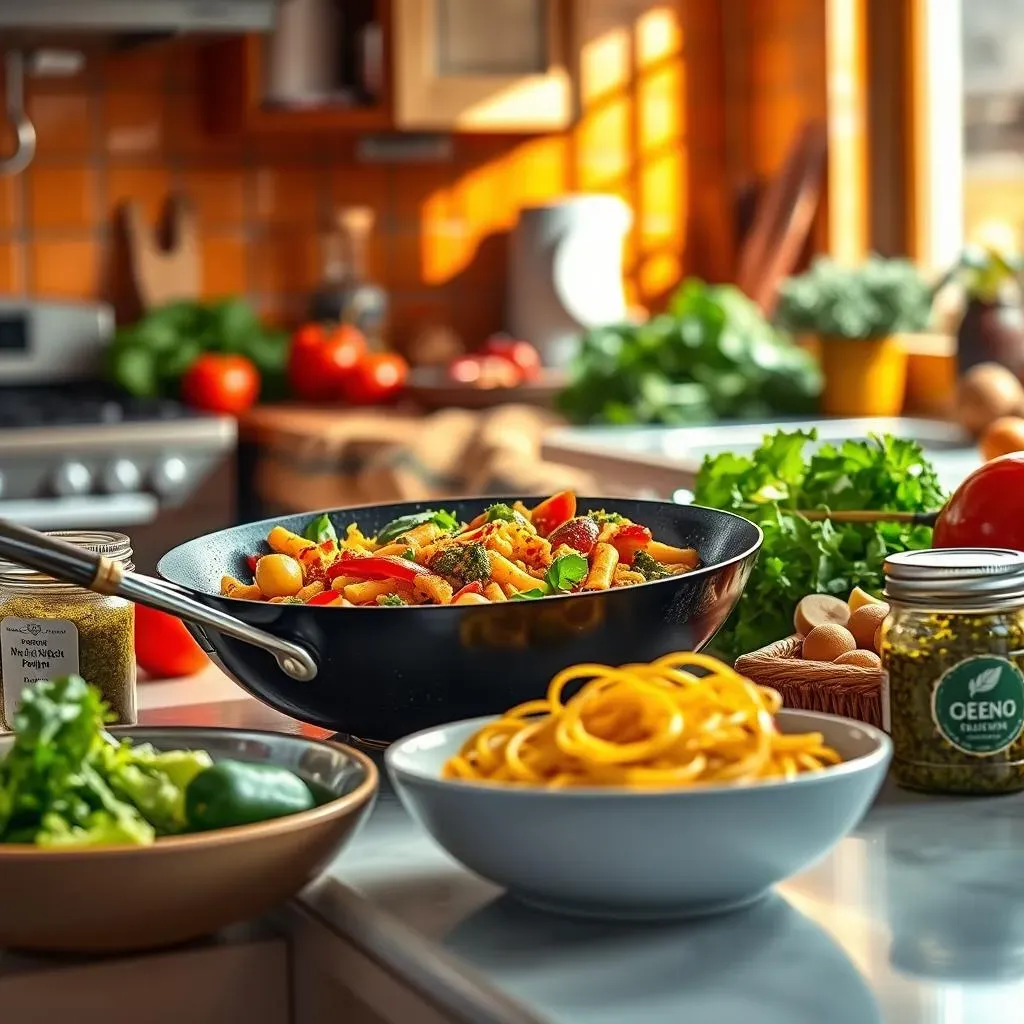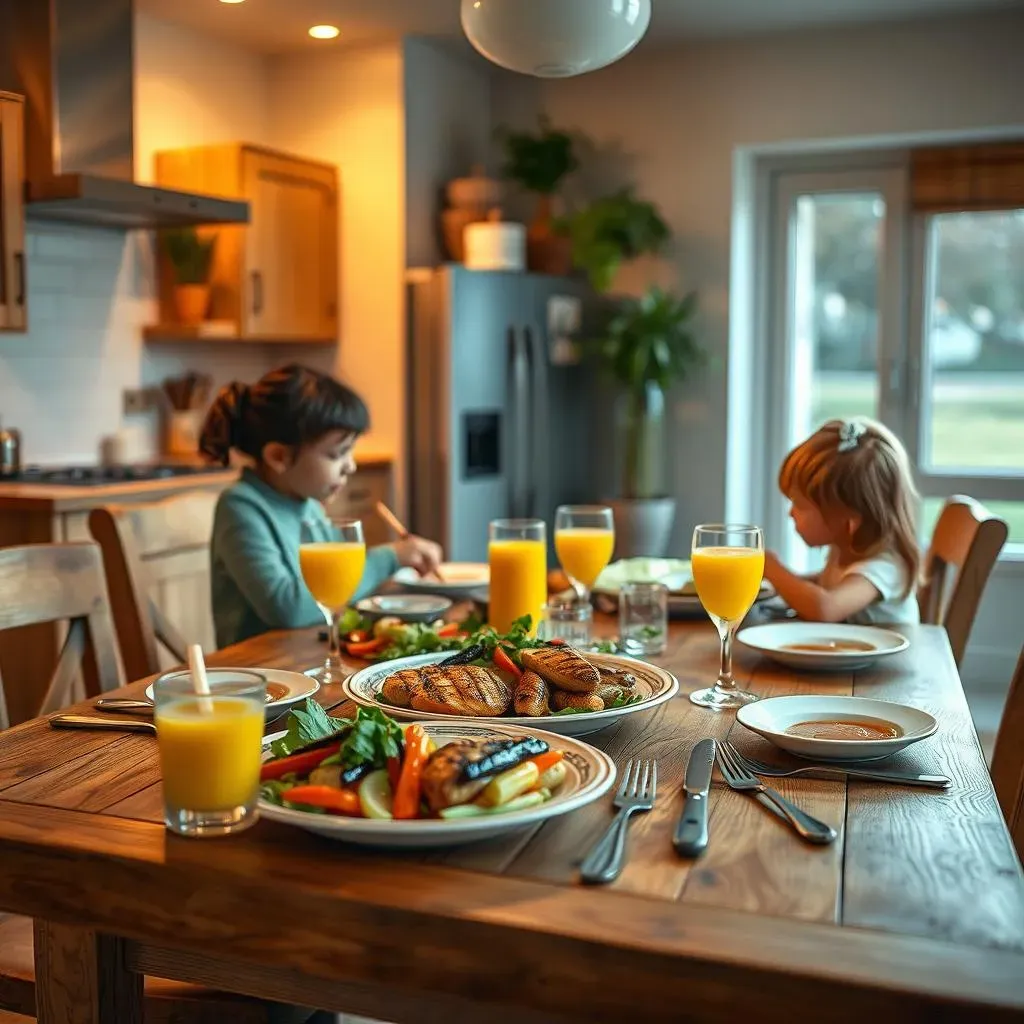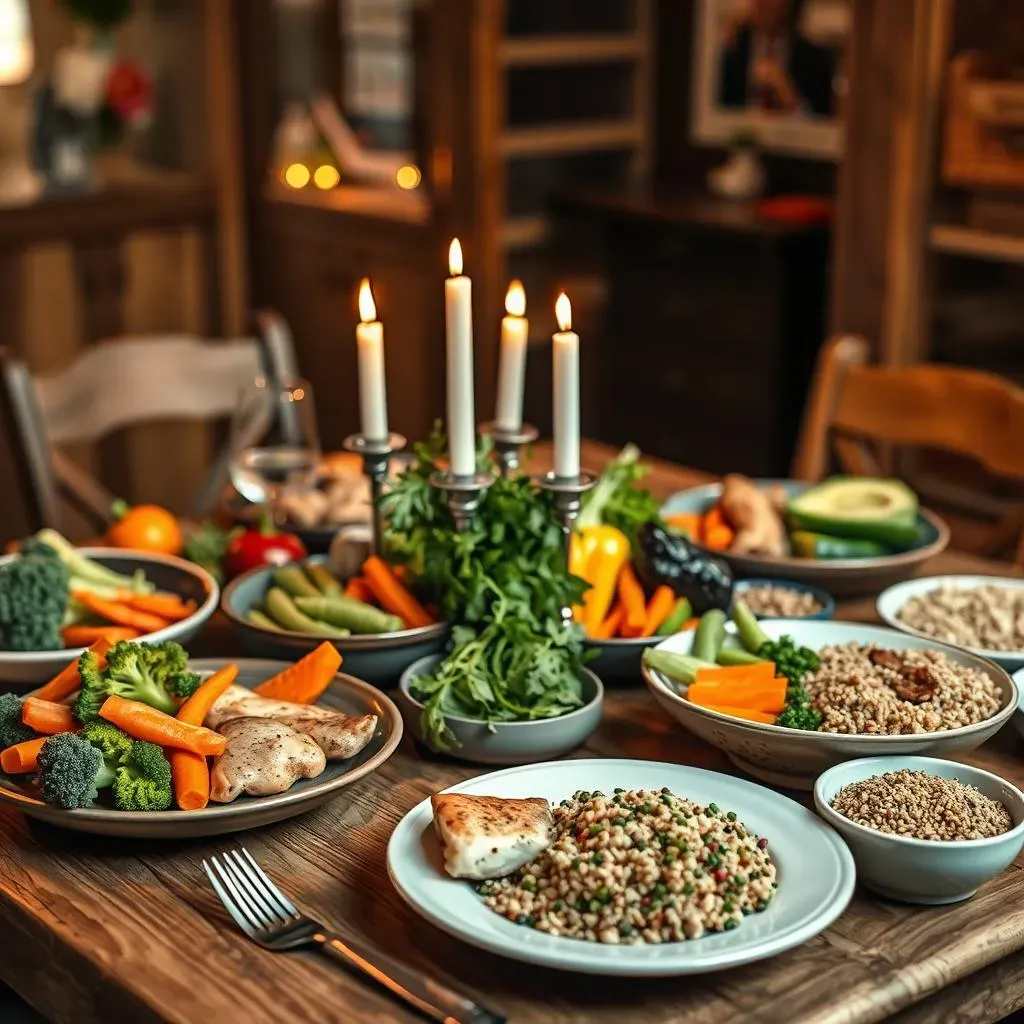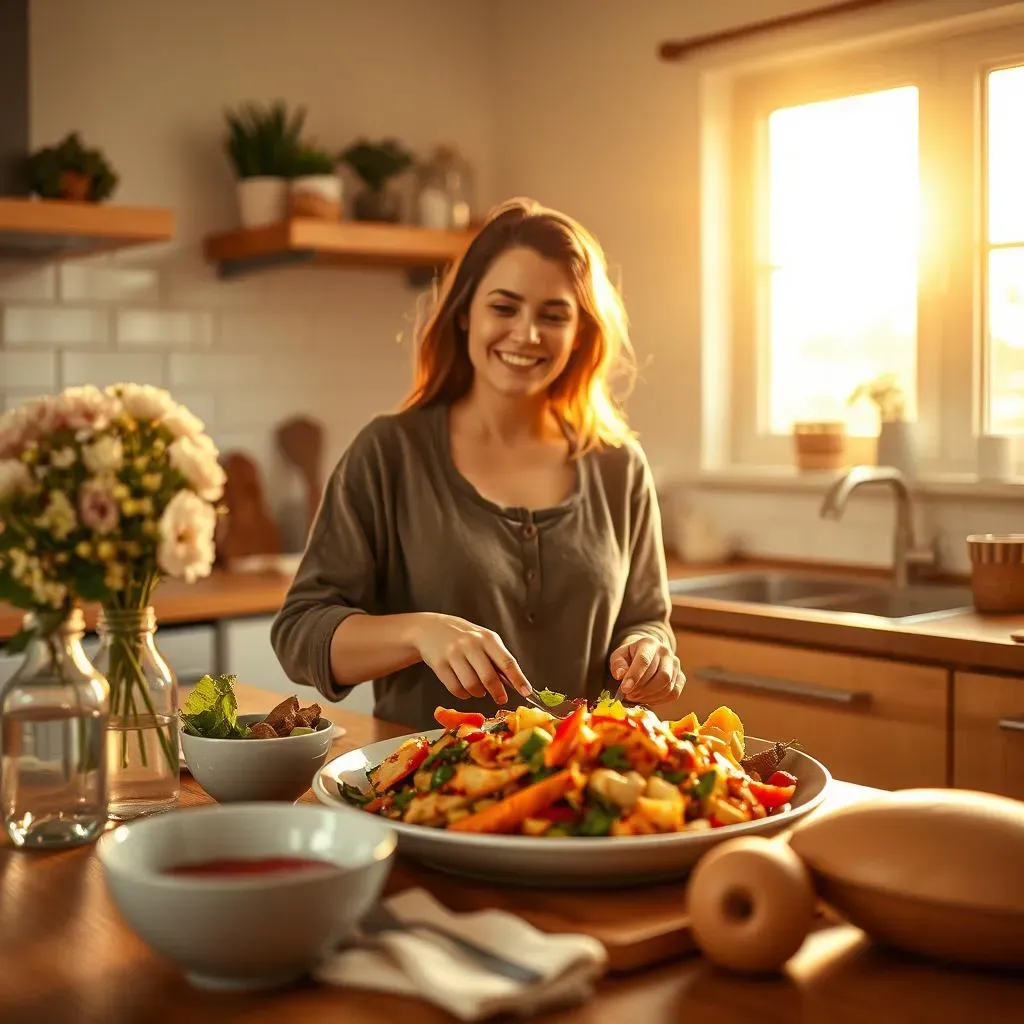Table of Contents
Ever stared into your fridge, wondering how to have a healthy dinner? You're not alone. It's easy to get caught in the whirlwind of busy days and reach for the quickest option, which isn't always the healthiest. But what if I told you that creating a nutritious and delicious dinner doesn't have to be a chore? This article is your guide to making healthy dinners a simple and enjoyable part of your routine. We'll skip the complicated recipes and focus on practical tips and tricks that you can use every single day. From quick meal ideas to smart shopping strategies, I'll show you how to make choices that are good for your body and your taste buds. We will explore the importance of planning, the power of ingredients, and how to make healthy eating a habit. By the end of this, you'll have the know-how to whip up tasty and good-for-you dinners without any stress. Let's get cooking!
Quick & Easy Healthy Dinner Ideas

Quick & Easy Healthy Dinner Ideas
Embrace the 15-Minute Meal
Let's be real, sometimes you've got, like, zero time to cook. That's where the magic of 15-minute meals comes in. Think of it as your culinary superpower for those hectic evenings. I'm talking about those nights when you're rushing in from work, or the kids are screaming for food, and you just want something fast that doesn't involve a drive-thru. The key here is simplicity, and having a few go-to options that you can whip up without needing a culinary degree. My go to is a quick stir-fry with whatever veggies I have on hand. Add some pre-cooked chicken or tofu, and boom, dinner is served.
These aren't just about speed, they are about smart choices. It is very easy to fall into the trap of thinking fast food is the only option when time is tight, but it is not true. By keeping some healthy staples in your pantry – think canned beans, whole-grain pasta, and frozen veggies – you can assemble a nutritious meal in a flash. I even keep a jar of pre-made pesto in my fridge for those nights when I want to add a burst of flavor without any effort. It's all about being prepared, and knowing that a healthy meal doesn't have to take hours to prepare.
Quick Dinner Idea | Main Ingredients | Prep Time |
|---|---|---|
Quick Stir-Fry | Frozen veggies, pre-cooked protein, soy sauce | 15 minutes |
Pasta with Pesto | Whole-grain pasta, pesto, cherry tomatoes | 10 minutes |
Black Bean Tacos | Canned black beans, salsa, tortillas | 10 minutes |
One-Pan Wonders and Speedy Salads
Another lifesaver in the quick-and-easy department? One-pan meals. Seriously, these are game-changers. You toss everything onto a baking sheet, stick it in the oven, and let the magic happen. Minimal cleanup, maximum flavor. I love roasting a bunch of veggies with some chicken sausages or salmon. Everything cooks together, and you end up with a complete meal. The best part? You can customize it to your liking. Swap out the veggies, change up the protein, and you've got a brand-new meal every time. It is so easy and so versatile.
And if you're not feeling like turning on the oven, salads are your friend. But we're not talking about sad, boring lettuce salads here. Think vibrant, loaded salads with a mix of greens, crunchy veggies, healthy fats, and a tasty protein source. I often add chickpeas, avocado, and some grilled chicken to mine. A good dressing is key, too. I like to make a simple vinaigrette with olive oil, lemon juice, and a little bit of Dijon mustard. It's quick, healthy, and oh-so-satisfying. Don't be afraid to experiment with different flavors and textures.
Planning Your Healthy Dinner: Simple Steps

Planning Your Healthy Dinner: Simple Steps
The Power of Meal Planning
let's talk about meal planning, it's not as boring as it sounds, I promise. Think of it as your secret weapon against those "what's for dinner?" dilemmas. Seriously, taking just a little bit of time to plan your meals for the week can make a huge difference. I'm not saying you need to map out every single meal like some kind of military operation, but having a general idea of what you're going to eat makes grocery shopping way easier and keeps you from making last-minute, unhealthy choices. For me, it's like having a roadmap for the week, it helps me to stay on track and eat better. I usually spend about 30 minutes on the weekend, looking through recipes and making a list.
It's not just about avoiding unhealthy choices, it's about making sure you're actually eating a balanced diet. When you plan, you can make sure you're getting enough fruits, vegetables, and protein in your meals. I like to look at my meal plan and see if I have enough variety, because eating the same thing every day can be boring. It also helps me to use up food before it goes bad, which cuts down on food waste. It's like a win-win situation, you're saving money, eating healthier, and not throwing food away.
Benefits of Meal Planning | How it Helps |
|---|---|
Reduces Stress | No more last-minute dinner panics |
Saves Money | Avoids impulse buys and food waste |
Ensures Balanced Diet | Includes a variety of healthy foods |
Saves Time | Efficient grocery shopping and meal prep |
Creating a Weekly Menu
So, how do you actually create a weekly menu? It's easier than you might think. Start by picking a day of the week to plan your meals. I find that Saturday or Sunday works best for me. Then, think about what kind of meals you enjoy and try to balance out your options. I usually aim for a mix of different proteins, veggies, and grains. Don't overcomplicate things, keep it simple and realistic. I always include some quick meals for those busy weeknights, and some more elaborate ones for the weekend, when I have more time to cook. It's all about finding a routine that works for you. You don't have to be a Michelin star chef, just be organized.
Another tip is to look at what you already have in your fridge and pantry before you go grocery shopping. This helps you to use up what you already have and avoid buying things that you don't need. I also like to check out what's on sale at the grocery store and plan my meals around that. It's a great way to save money and try new things. And don't be afraid to get creative. It's okay to experiment with different recipes and flavors. It can be a lot of fun, and you might discover some new favorite meals. Cooking shouldn't be boring!
Smart Grocery Shopping
you've got your meal plan, now it's time to hit the grocery store. But wait, don't just grab anything that looks good. A smart grocery shopping strategy is just as important as your meal plan. This means sticking to your list and avoiding those tempting impulse buys. I always try to go to the grocery store after I've eaten, because if I go when I'm hungry, I tend to buy everything. I also like to shop the perimeter of the store, where you can find all the fresh produce, meats, and dairy products. The inner aisles usually have more processed foods.
And don't forget to check the labels. I always take a look at the nutrition facts and ingredients list. Pay attention to things like added sugars, sodium, and unhealthy fats. It can make a big difference in your overall health. And finally, be patient with yourself. It takes time to develop healthy eating habits. Don't get discouraged if you slip up every now and then, just get back on track at your next meal. It's all about progress, not perfection. Remember, it's all about making small changes that add up to big results.
How to Have a Healthy Dinner: Ingredients Matter

How to Have a Healthy Dinner: Ingredients Matter
The Power of Protein
Alright, let's chat about protein because it's the real deal when it comes to a healthy dinner. Think of protein as the building blocks for your body. It keeps you feeling full and energized. It also helps repair and build muscle. I'm not saying you need to eat a giant steak every night. There are so many great ways to get your protein. Lean meats like chicken and turkey are awesome, but don't forget about fish. Salmon, tuna, and cod are packed with protein and healthy fats. If you're not into meat, no problem! Beans, lentils, tofu, and tempeh are all excellent plant-based options. I like to mix it up throughout the week to get a variety of nutrients. The key is to make sure you're getting enough protein, whatever form it takes.
It's also about how you prepare your protein. Grilling, baking, or steaming are all healthier options than frying. I often marinate my chicken or tofu to add flavor without adding a ton of extra calories. A little bit of lemon juice, garlic, and herbs can go a long way. And don't be afraid to experiment with different spices and seasonings. It's all about finding ways to make healthy food taste delicious. I've found that when I enjoy my food, it's much easier to stick to healthy eating habits. Remember, protein is your friend, so make sure to include it in your dinner.
"The food you eat can be either the safest and most powerful form of medicine or the slowest form of poison." - Ann Wigmore
Vibrant Veggies and Smart Carbs
Now, let's talk about the colorful crew: veggies! They're not just for show; they're packed with vitamins, minerals, and fiber. I try to load up my plate with as many different colors as possible. Think about it: dark leafy greens, bright red peppers, orange carrots, and purple cabbage. Each color brings its own unique set of nutrients. I'm obsessed with roasting veggies because it brings out their natural sweetness. Toss them with a little olive oil, salt, and pepper, and they're good to go. Steaming and grilling are also great ways to cook veggies without adding a lot of extra fat. And don't forget about raw veggies. They're perfect for snacking or adding to salads.
And what about carbs? They've gotten a bad rap, but they're an important source of energy. The key is to choose smart carbs, like whole grains. Think brown rice, quinoa, whole-wheat bread, and sweet potatoes. These are packed with fiber, which helps keep you full and regulates your blood sugar. I try to avoid refined carbs like white bread and pasta, because they don't offer much in the way of nutrients. I often use quinoa as a base for my bowls, or I'll make a batch of brown rice to use throughout the week. It's all about making choices that fuel your body in the right way. Balance is key, so make sure you have a good mix of veggies and smart carbs in your dinner.
Food Group | Examples | Benefits |
|---|---|---|
Lean Proteins | Chicken, fish, beans, tofu | Builds muscle, keeps you full |
Colorful Veggies | Spinach, carrots, peppers, broccoli | Vitamins, minerals, fiber |
Smart Carbs | Quinoa, brown rice, sweet potatoes | Energy, fiber, regulates blood sugar |
Making Healthy Dinner a Habit

Making Healthy Dinner a Habit
Small Changes, Big Impact
so you've got some ideas on what to eat and how to plan, but how do you actually make healthy dinner a habit? It's not about making huge, drastic changes overnight. It's about starting small and building from there. Think of it like learning a new skill. You wouldn't try to run a marathon on your first day of training, right? It's the same with healthy eating. Maybe start by adding one extra veggie to your dinner each night, or swapping out white bread for whole wheat. These small changes might not seem like much, but they add up over time. I like to focus on one or two things at a time, instead of trying to overhaul my entire diet. It makes it way less overwhelming and way more sustainable. It is all about progress, not perfection.
Another thing that has helped me is to find a few go-to recipes that I know I can make easily and that I enjoy. It takes the guesswork out of dinner time and makes it easier to stick to my plan. I keep a list of these recipes on my phone, so I can always refer back to it when I'm feeling uninspired. And don't be afraid to ask for help. Talk to your friends or family about your goals, or try to cook with someone. It can make it more fun and keep you accountable. Remember, it's not a race, it's a journey. Be patient with yourself and celebrate your progress along the way. You got this!
"The greatest of follies is to sacrifice health for any other kind of happiness." - Arthur Schopenhauer
Dealing with Setbacks
Let's be real, there are going to be times when you slip up. Maybe you had a super long day at work and ended up ordering pizza, or maybe you went out to dinner and didn't make the healthiest choices. It happens to everyone. The key is not to beat yourself up about it. It's okay to have a treat meal every now and then. The most important thing is to get back on track at your next meal. Don't let one bad meal turn into a bad day, or a bad week. I always tell myself that each meal is a fresh start, and it is a new opportunity to make a healthy choice. It is like falling off a bike, you just need to get back on and keep pedaling.
Another thing that helps me is to plan for those moments when I know I might be tempted to make unhealthy choices. For example, if I know I'm going to be traveling, I'll pack some healthy snacks with me, so I'm not tempted to grab something from a gas station. Or if I know I'm going to a party, I'll make sure to eat something healthy beforehand, so I'm not starving and more likely to overindulge. It's all about being prepared and having a plan in place. And remember, consistency is key. It's about making healthy choices more often than not, and not about being perfect all the time. So, don't get discouraged if you have a setback. Just learn from it and move forward. You're doing great!
Strategy | How it Helps |
|---|---|
Start Small | Avoids feeling overwhelmed |
Go-To Recipes | Makes meal planning easier |
Plan for Setbacks | Reduces the temptation for unhealthy choices |
Be Kind to Yourself | Encourages consistency |
Making it a Lifestyle
Ultimately, making healthy dinners a habit is about making it a part of your lifestyle. It's not a short-term diet, it's a long-term commitment to your health and well-being. It's about finding a way of eating that you enjoy and that you can stick with for the long haul. I've found that when I focus on how good healthy food makes me feel, instead of how much weight I need to lose, it's much easier to stay motivated. It's about nourishing your body with the nutrients it needs to thrive. And it's about enjoying the process. Cooking can be a lot of fun, especially when you get creative and try new things. It's also a great way to connect with your family and friends. I love cooking with my kids, it is a great way to spend time together and teach them about healthy eating.
So, what are you waiting for? Start small, be patient with yourself, and remember that every healthy choice you make is a step in the right direction. It's not about perfection, it's about progress. You've got the tools you need to make healthy dinners a part of your life. Now, go out there and cook up something delicious! And don't forget to share your creations with me, I love to see what you're making. You're on your way to a healthier, happier you. Keep it up!
Wrapping Up Your Healthy Dinner Journey
So, there you have it. Creating a healthy dinner doesn't require a culinary degree or hours in the kitchen. It's about making small, smart choices consistently. Remember, planning ahead can save you from last-minute unhealthy options, and focusing on whole, nutritious ingredients will make you feel fantastic. Don't be afraid to experiment with flavors and find what you enjoy. Making these changes can be a journey, but every step you take is an investment in your well-being. Keep up the great work and enjoy all the delicious, healthy dinners ahead!